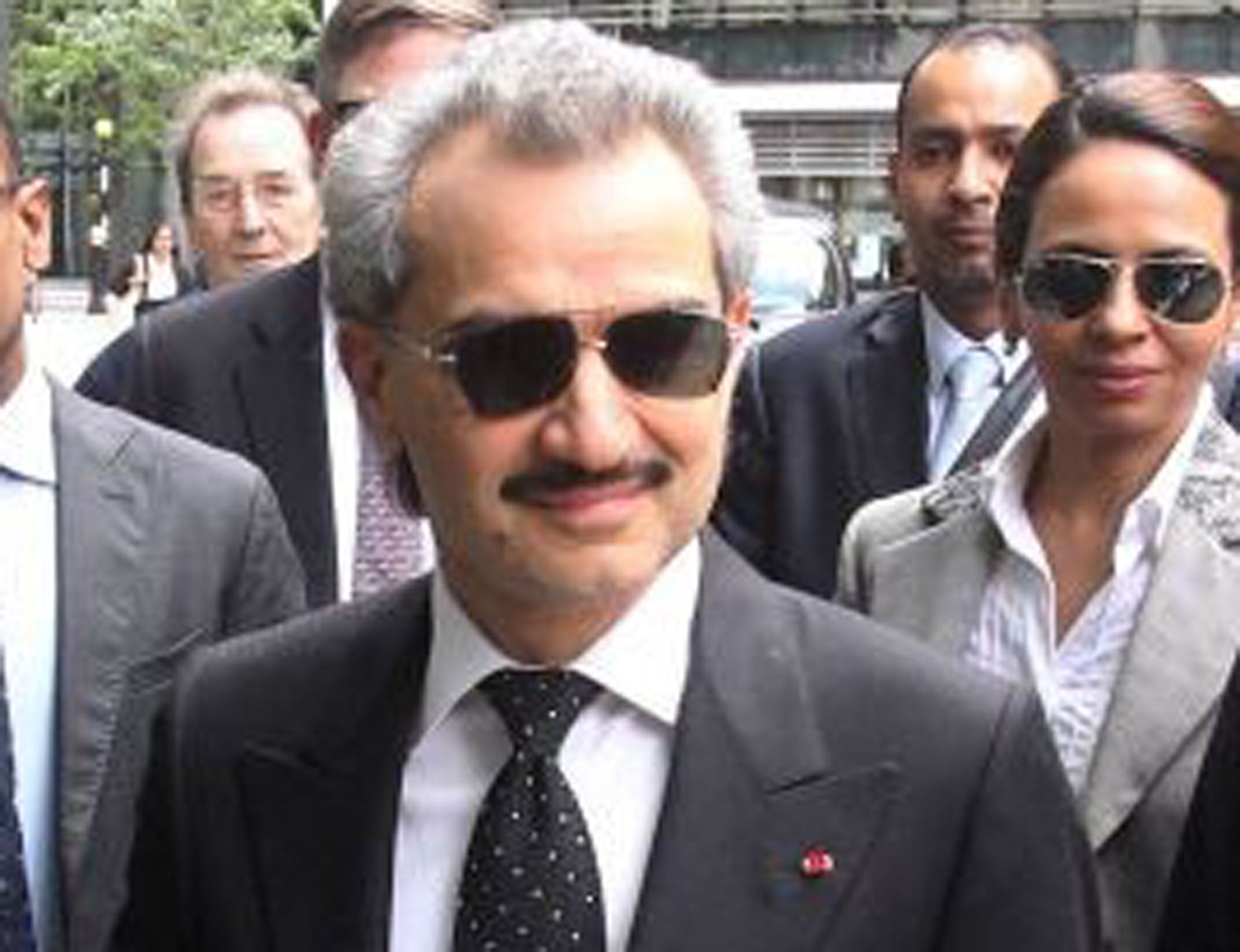Saudi prince Al-Waleed Bin Talal denies reneging on payment to woman who brokered sale of luxury jet to Colonel Gaddafi
Billionaire tells court: 'This plane was a drop in the sea of what I do every day'

A Saudi royal billionaire yesterday told the High Court that “every dollar counts” as he denied reneging on a deal to pay a businesswoman a seven-figure commission on the sale of his luxury jet to Colonel Gaddafi.
Prince Al-Waleed Bin Talal, one of the world’s richest men with an estimated fortune of more than £12 billion and assets including London’s Savoy Hotel, described how he decided to dispose of one of the two customised airliners he owned and entered a tortuous transaction with the former Libyan dictator as part of a wider project to help Gaddafi rebuild his relationship with the international community prior to his bloody death in 2011.
In the first cross-examination of a senior member of the Saudi royal family before the High Court, the prince confirmed that he had used a Jordanian consultant, Daad Sharab, who had close links to Colonel Gaddafi, to help strike the $120 million (£79 million) deal in 2003 to sell him his Airbus A340, complete with silver leather sofas and a whirlpool bath.
But the 58-year-old businessman, who is the nephew of King Abdullah of Saudi Arabia, denied he had agreed to pay Mrs Sharab a commission of £6.5 million once the transaction had been completed - and indeed a “wholly untrue” claim from the Jordanian that the prince had been so impressed with her work that he asked her to marry him.
The prince said that as sale of the aircraft - eventually used to transport Lockerbie bomber Abdelbaset Al Megrahi back home - became entrenched in a row over its final price, he was increasingly convinced Mrs Sharab was acting primarily for the Libyans and not “entitled to one cent”.
He said: “She was, in my eyes, becoming overwhelmingly concerned with her own position and relationship with the Libyans. I was irritated by her attitude and her apparent attempt to play both sides against each other.”
In a rare insight into the business dealings and philosophy of the prince, who owns substantial stakes in Citigroup and News Corp, he told the court that he met Mrs Sharab on his yacht in Cannes and told her she would only be paid for her services once the Airbus was sold and the sum would be at his “discretion”.
In a reference to a previous deal in Libya, which resulted in Mrs Sharab being paid $500,000 by the prince, Mr Justice Peter Smith suggested to the billionaire royal: “In the context of your finances half a million dollars is not a lot.”
The prince, dressed in a dark suit and clutching a string of prayer beads, replied: “Your lordship, each dollar is important for me.”
Emphasising his response, the Saudi royal, who is currently suing Forbes magazine over an article which he claims under-estimated his fortune and insulted the Saudi business community, added: “Every dollar counts.”
The court was told that “selling a plane to Gaddafi” was “just one item” in a wide-ranging business agenda which took the prince around the globe in some considerable style.
In a witness statement, he said: “In or around summer 2001, I decided that I would sell one of my large aircraft (either the Airbus A340 or the Boeing 767) as I had recently entered into an agreement to acquire a new large aircraft and did not need three large aircraft. I identified Colonel Gaddafi as a potential buyer.”
The court heard that a complex deal brokered by Mrs Sharab and another consultant, Fouad Alaeddin, was eventually reached with Gaddafi, who was anxious to use Prince Al-Waleed to bridge the “gap” with the west following the lifting of sanctions on Libya in 1999 and set up joint ventures including a possible media company. The prince said: “He wanted to buy the plane to show he is close to me.”
The deal began to sour after a payment failed to materialise in July 2003.
The prince, who contrasted his tight business schedule with the “disorganised” Gaddafi, told the court that the wrangle was only finalised after he used his own personal relationship with the dictator and flew to Tripoli with Mrs Sharab to strike a revised deal in 2005.
Under cross-examination, the prince denied deliberately down-playing the importance of the role played by Mrs Sharab, who ferried letters by private plane between the two men and was later placed under house arrest by the Gaddafi regime.
When challenged by Clive Freedman QC, for Mrs Sharab, about his recollection of the Airbus sale, the prince said: “This plane was a drop in the sea of what I do every day.”